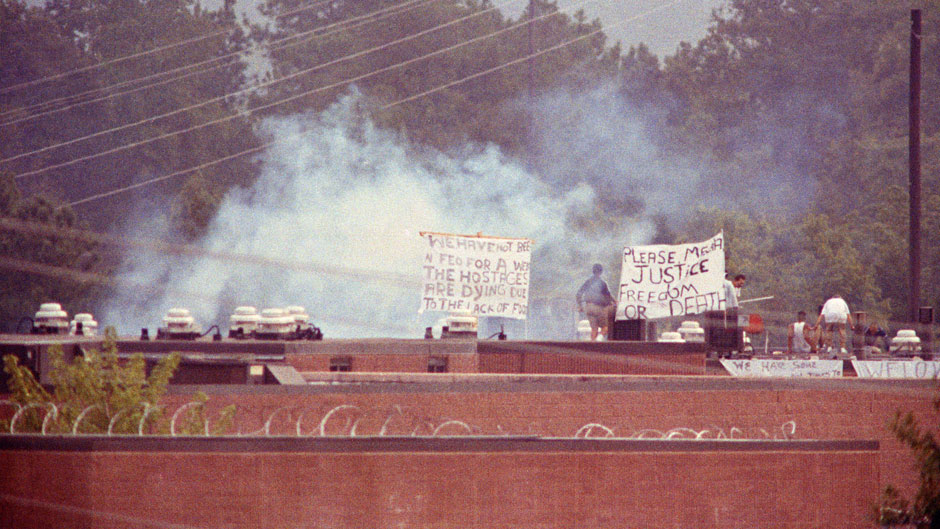For 11 days in August 1991, a group of Cuban refugees from the Mariel boatlift—an exodus from the island that brought more than 120,000 people to the U.S. in 1980—took over a federal prison in Talladega, Alabama, and held prison officials hostage.
Deemed “excludable” for purposes of resettlement, the inmates had spent years in detention. They had exhausted their appeals through the United States legal system and were to be sent back to Cuba, but they didn’t want to return. The uprising was eventually defused.
A photograph of the detainees during the standoff piqued the interest of two investigative reporters and producers from National Public Radio—Andrew Beck Grace and Chip Brantley—who decided to look back at the episode in the second season of their podcast “White Lies,” a past finalist for the Pulitzer Prize. The program examines forgotten incidents and mysteries in U.S. history, particularly regarding the history of race relations, and attempts to find out what really happened.
“This story started when we first heard about a forgotten prison riot in rural Alabama in the early ’90s,” said Brantley. “Digging into what happened, we saw that there was a much larger story about the creation of our modern immigration system. A story about how we decide who has the right to have rights. Mariel itself is just such a fascinating story. It’s so complex and it’s often misremembered all throughout the country.”
On Monday, Feb. 27, the panel “Investigating the Indefinite Detention of Mariel Refugees: A Conversation on Season 2 of NPR’s ‘White Lies,’ ” will be held at 7 p.m. at the Bill Cosford Cinema at the University of Miami Coral Gables Campus.
Michael Bustamante, associate professor of history and Emilio Bacardí Moreau Chair in Cuban and Cuban American Studies, and Antonio Mora, Frances L. Wolfson Chair in Communication at the School of Communication, will moderate the seminar.
“This season of ‘White Lies’ explores an overlooked but crucial moment in recent U.S. history,” said Bustamante, “a moment when the values that the United States purports to defend as a place of refuge bumped up against the nitty gritty and sometimes ugliness of what actually happens under U.S. immigration policy and U.S. immigration law,” he added. “This is a story of men who fell through the cracks into legal limbo, which became a purgatory.”
The origins of the Talladega incident began 11 years earlier during the Mariel Boatlift, which brought thousands of Cubans, including many single men, to U.S. shores in a matter of weeks.
At the time of the boatlift, rumors swirled that Cuban president Fidel Castro had “emptied” Cuban jails and forced thousands of criminals to leave. But while there is incontrovertible evidence some of this transpired, the podcast shows that estimates were egregiously inflated, often lacked context and evidence, and were fueled by stereotype. The fact that many Mariel refugees were Black, the podcast explores, only amplified stereotypes about them.
Moreover, even though under U.S. immigration law a criminal past can be grounds for exclusion from entry, Bustamante, who is interviewed in the podcast episode, noted that it is important to think critically about what a criminal record in Cuba might have meant at the time.
“What I ask in the podcast is, ‘Why would a Cuban citizen be in jail?’ ” he said. “It is not the same thing to have committed murder as to have stolen food from a store or participated in the black market. But in the heat and hype of the moment, these distinctions were lost, and hundreds of Mariel refugees paid the price.”
Grace and Brantley, the two producers, will be joined on the panel by Brianna Nofil, assistant professor at the College of William and Mary and former Goizueta Fellow at the University’s Cuban Heritage Collection; Mirta Ojito, author of “Finding Mañana: A memoir of a Cuban Exodus;” and Daniel Rivero, creator of the WLRN podcast “Detention by Design,” which similarly explores the history of immigration detention, with a partial focus on Mariel.
Ojito, who wrote the memoir of her journey to the U.S. as a teenager in the boatlift, feels that the “White Lies” podcasts are much more than just a reflection on a prison uprising.
“Without a doubt, there is a value to investigating news events after the passage of time,” she said. “Distance gives you perspective and historical context. However, in this particular case, it seems clear the producers are using the anecdote of the riot to tell a bigger story or stories. The Mariel boatlift, yes, but also this is a podcast about detention and about the meaning of justice.”
Grace hopes the podcast’s listeners will “get a richer and fuller understanding of our immigration policy, the roots of immigration detention, and the role that Mariel played in shaping the policies we have today.”
The event is co-sponsored by WLRN (Miami’s NPR affiliate) and, at the University of Miami, the Emilio Bacardi Moreau Chair in Cuba and Cuban American Studies; the Cuban Heritage Collection at University Libraries; School of Communication; Center for Global Black Studies; and the Immigration Clinic at the School of Law.
Register to attend the panel discussion.

